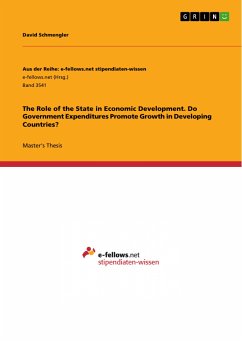Master's Thesis from the year 2018 in the subject Economics - Economic Cycle and Growth, grade: 7, University of Groningen (Faculty of Economics and Business), language: English, abstract: This paper examines the role of the state in economic development. In particular, we test the impact of aggregated and sectoral government expenditures on economic performance in developing countries. Our findings suggest that total government expenditures are negatively related to economic development in both low income and middle income developing countries. However, we find particular evidence that government expenditures prove to be more beneficial for growth when a country is characterized by a well-functional institutional design. In contrast to previous studies, we do not find positive and significant results for sectoral government expenditures. In fact, our findings suggest that transport and communication, defense and health expenditures are negatively related to economic development. At the same time, public and private investments appear to be positively related to economic development throughout our analysis. Therefore, we conclude that - instead of government expenditures - stimulating investments and institutional reforms should play a major part on the political agenda of developing countries.
Dieser Download kann aus rechtlichen Gründen nur mit Rechnungsadresse in A, B, BG, CY, CZ, D, DK, EW, E, FIN, F, GR, HR, H, IRL, I, LT, L, LR, M, NL, PL, P, R, S, SLO, SK ausgeliefert werden.









